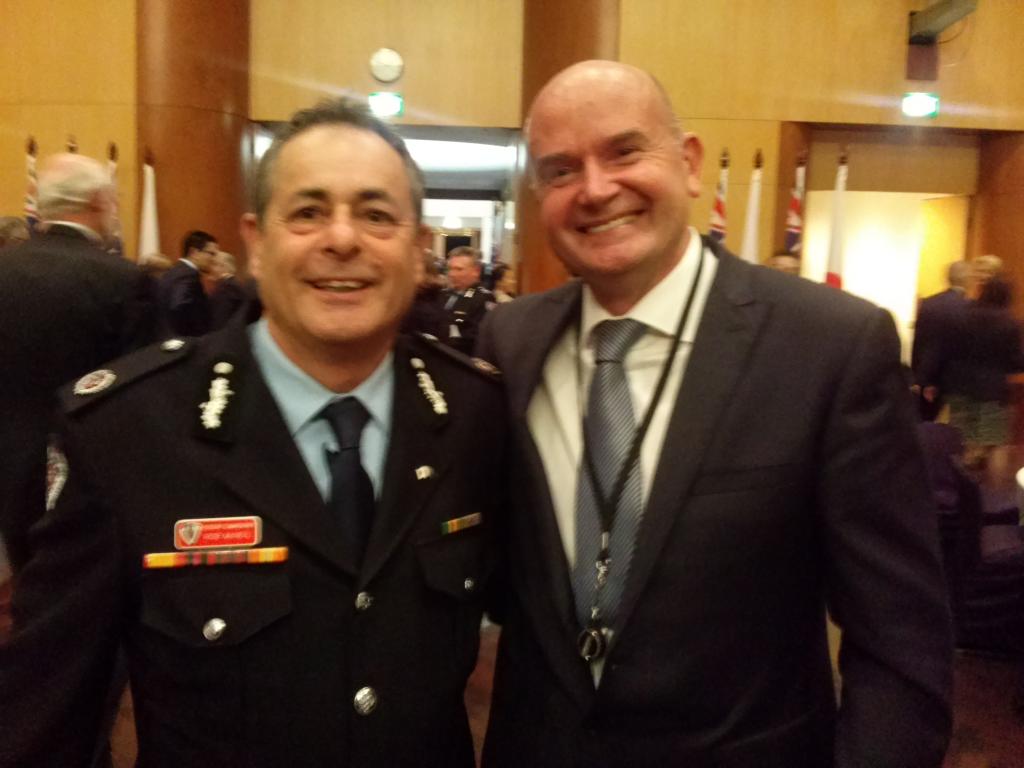AREEA chief executive Steve Knott (right) with Japanese Prime Minister Shinzo Abe (centre).AUSTRALIAN Mines and Metals Association chief executive Steve Knott represented the national resource employer group in Canberra last week as witness to the historic address made to parliament by Japanese Prime Minister, his Excellency Shinzo Abe.
In his address, the Prime Minister acknowledge the horrors of the past century’s history and a commitment for them never to be repeated, welcoming a new era of open relations between Japan and Australia.
“When we Japanese started out again after the Second World War, we thought long and hard over what had happened in the past and came to make a vow for peace with our whole hearts,” the Prime Minister said.
“This vow that Japan made after the war is still fully alive today and it will never change going forward.”
Referring to the impact of former Prime Minister Robert Menzies, Prime Minister Abe expressed ‘great and whole-hearted gratitude for the spirit of tolerance and for the friendship Australia has shown to Japan’.
In particular, he praised Menzies for being the first to welcome a Japanese prime minister to Australia in the years following World War II, marking the onset of the commerce treaty now at the cornerstone of 80% of Australia’s exports to Japan.
“Signed 57 years ago, this was the start of Australian coal, iron ore and natural gas coming into Japan,” Prime Minister Abe said.
“The second coming of Japan’s industry after the war first became possible through the help of Australia, our indispensable partner.”
The Prime Minister shared insight into current developments in Japan’s economic climate, focusing on productivity and fiscal discipline as well as workplace standards that encourage diversity.
“Reforms are now starting in the fields of agriculture, energy policy and medicine, and for the first time in decades, we have also started to reform old norms in our labour relations,” he said.
“Since the beginning, I have stressed that I want to make Japan a place where women shine.”
 Mr Robert McNeil (left) with Steve Knott (right).Following further commentary on partnership opportunities between Australia and Japan, Prime Minister Abe also acknowledged the contribution of regional operations director for Fire and Rescue New South Wales, Mr Robert McNeil.
Mr Robert McNeil (left) with Steve Knott (right).Following further commentary on partnership opportunities between Australia and Japan, Prime Minister Abe also acknowledged the contribution of regional operations director for Fire and Rescue New South Wales, Mr Robert McNeil.
“Minamisanriku, in Japan’s Miyagi prefecture, was one of the towns that suffered the very worst damage from the tsunami that hit our Tohoku region on 11 March 2011, but Mr McNeil, leading a team of 76 people and two dogs, immediately came to Minamisanriku,” the Prime Minister said.
“There he worked together with firefighters from Japan. Mr McNeil said ‘When the Japanese firefighters were grieving, we were able to share their grief. There were no walls of communication between us’.
“We will keep his words in our hearts warmly forever.”
Steve Knott (left) and wife Cathy (right) with Dawn Fraser (centre).[IMAGE] Closing his address, the Prime Minister shared his anticipation for the Tokyo 2020 Olympic Games, giving special mention to former Olympic champion Dawn Fraser who watched on in the public gallery.
“Ms Fraser, to me, you are Australia, and in 2020, I hope we will see you in good shape in Tokyo once more.”
Representing Australia’s resource employers, Mr Knott enjoyed the privilege of meeting Prime Minister Abe and discussing the bilateral contributions of both Japan and Australia in the past, present and future.
“Japanese demand for coal, iron ore and natural gas has been a strong driver of Australia’s export revenue and economic prosperity, with $36.2bn worth of trade in these commodities in the 2012-13 financial year alone,” he said.
“The Free Trade Agreement signed with Japan during Mr Abe’s visit is perfectly timed with Australia emerging as a global powerhouse of LNG production and bullish economic growth likely to see Japanese energy demand increase exponentially,” Mr Knott said.
Mr Knott said the agreement would enable a more accessible market place with reductions and removals of tariffs for both nations, benefitting major exports and making Japanese imports, such as electrical goods, cheaper and more accessible to Australian consumers.



